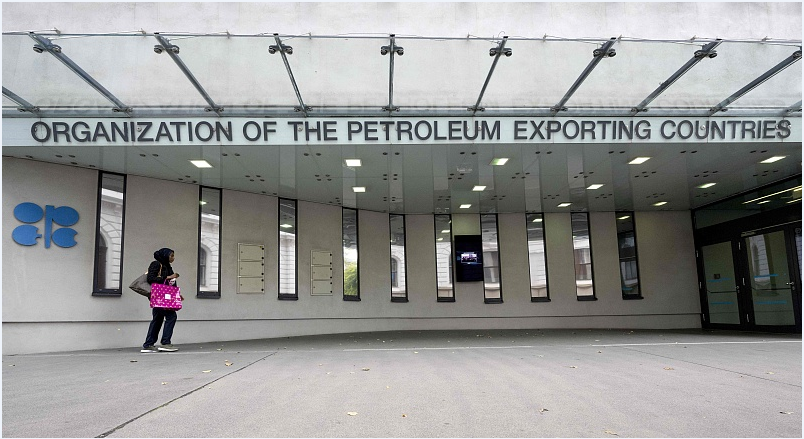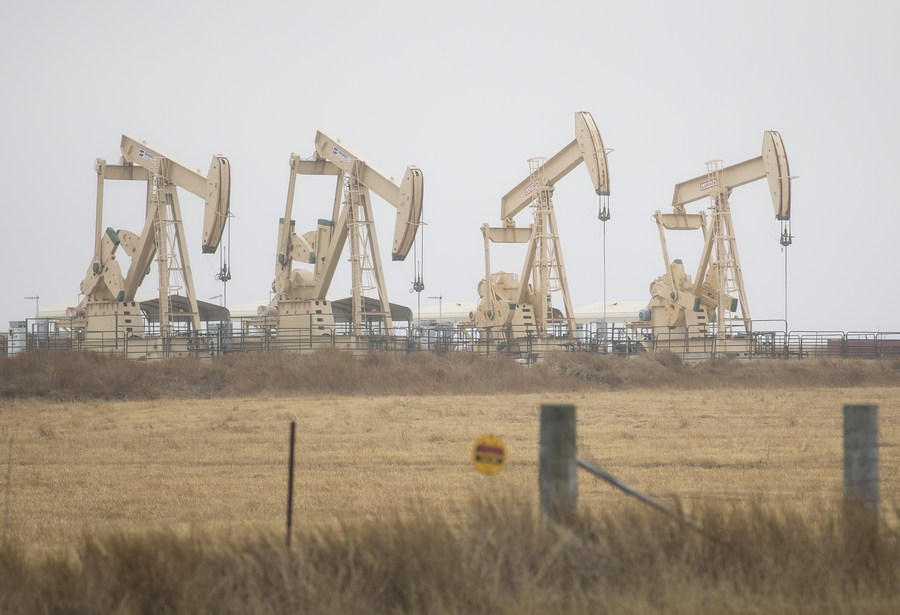
On eve of 33rd OPEC and non-OPEC Ministerial Meeting held on October 05, 2022, a woman walks past the OPEC headquarters building in Vienna, Austria, October 4, 2022. /CFP
On eve of 33rd OPEC and non-OPEC Ministerial Meeting held on October 05, 2022, a woman walks past the OPEC headquarters building in Vienna, Austria, October 4, 2022. /CFP
Editor's note: Thomas W. Pauken II is the author of "U.S. vs China: From Trade War to Reciprocal Deal," a consultant on Asia-Pacific affairs and a geopolitical commentator. The article reflects the author's opinions and not necessarily the views of CGTN.
OPEC (Organization of the Petroleum Exporting Countries) and non-OPEC allies, a group known as OPEC+, gathered for a face-to-face meeting at its headquarters in Vienna, Austria on Wednesday. OPEC+ announced plans to reduce its oil production quota by 2 million barrels per day, starting from November.
The official ministerial meeting only lasted for about 30 minutes and OPEC Secretary-General Haitham Al Ghais followed up with a press conference to explain the reasoning behind the oil cuts.
Ghais said that OPEC+ was seeking to provide "security (and) stability to the energy markets." When asked by a reporter if the group's actions were focused only on pricing, he said, "everything has a price. Energy security has a price as well."
The oil quota cuts sound surprising since the United States, European Union and United Kingdom were warning OPEC+ members not to implement such major actions in the run-up to the meeting.
Nevertheless, oil markets have dropped to a price range in the low U.S. $80s in recent months. However, oil prices surged higher this week with Brent crude oil futures hitting $93.37, a $1.57 rise on Wednesday.
According to Energy Intelligence, United Arab Emirates (UAE) Energy Minister Suhail al-Mazrouei told reporters that economic concerns were the key driver behind the decision to lower production.
"A recession is one of the challenges we are looking at. We all know a recession affects supply and demand," he said.
Economy lowers energy demand
The world economy looks to be in poor shape and conditions continue to worsen. Additionally, U.S. President Joe Biden has not taken steps to boost domestic oil & gas production levels, since the White House is pushing ahead on a transition away from fossil fuels.

Oil derricks operate in Three Rivers, Texas, the United States, February 24, 2022. /Xinhua
Oil derricks operate in Three Rivers, Texas, the United States, February 24, 2022. /Xinhua
Instead, the Biden administration used short-term fixes by releasing about 1 million barrels of oil a day on average for the past six months from its Strategic Petroleum Reserves (SPR) to keep U.S. gas prices lower.
Nonetheless, oil producers are more concerned with supply and demand issues. Although oil prices are high, even at $80, oil and gas companies can't expect strong long-term energy demand when the international economy is headed for a downturn for the rest of this year and next.
During a downturn, energy consumers overall have less spending money and that impacts their living habits. They might use less electricity and heating at home and drive less if they own gas-fueled cars.
Soaring energy prices can also exacerbate high inflation pressures. Energy plays a crucial role in the global economy. Only a higher supply of energy resources can stabilize or lower oil and gas prices.
According to media reports, at a news conference after the meeting the Saudi energy minister, Prince Abdulaziz bin Salman, said OPEC+ was getting pro-active about preparing for a downturn in the world economy, which could cause demand for oil to soften and prices to drop.
"We would rather be pre-emptive than be sorry," he is quoted as saying.
Saudi Arabia loses patience with U.S.
Saudi Arabia, the United Arab Emirates, Iraq and Kuwait are expected to carry the brunt of the output cuts on oil quotas. Many other OPEC+ member states have struggled to meet production targets in recent months.
Accordingly, Saudi Arabia's Crown Prince Mohammed bin Salman (MBS) appears to be delivering a stern message to Washington.
President Biden and MBS met each other in person last July, while the White House hoped it would usher in warmer U.S.-Saudi Arabia bilateral relations.
The U.S. was also looking for Saudi Arabia to increase its oil exports as well back then. But the meeting of the two national leaders failed to deliver fruitful results.
Saudi Arabia is not looking to make friends with the Biden administration for the moment and the feelings appear mutual on the U.S. side.
The White House is quoted as saying in a statement that Biden was "disappointed by the shortsighted decision by OPEC+ to cut production quotas while the global economy is dealing with the continued negative impact of Putin's invasion of Ukraine."
Consequently, Biden has directed the Department of Energy to release another 10 million barrels from the Strategic Petroleum Reserve next month.
The White House added, "In light of today's action, the Biden Administration will also consult with Congress on additional tools and authorities to reduce OPEC’s control over energy prices."
The statement added that the OPEC+ announcement served as "a reminder of why it is so critical that the United States reduce its reliance on foreign sources of fossil fuels."
Yet, it's unlikely the U.S. can curtail its reliance on "foreign sources of fossil fuels" in the near future. Meanwhile, OPEC+ has to take its self-interests as a priority. A downturn of the world economy is looming ahead and that would result in lower energy demand.
OPEC+ is moving forward on big oil cuts to prepare for these circumstances. The next ministerial meeting for OPEC+ is scheduled for December 4.
(If you want to contribute and have specific expertise, please contact us at opinions@cgtn.com. Follow @thouse_opinions on Twitter to discover the latest commentaries in the CGTN Opinion Section.)